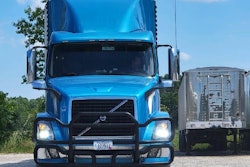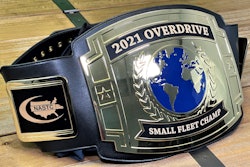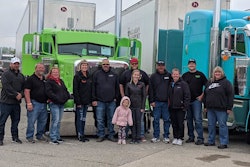
Krystal Raue, the owner of Decatur, Nebraska-based Triple R Trucking, was born and raised around trucking and worked in her parents’ hauling business from a young age doing paperwork and other jobs.
After going to college for a degree in business administration, she came back and continued to help the family business.
“As technology increased, I kind of started helping them transition into more of the technology side of things,” she said. “I was eventually managing my parents’ company, a reefer business.”
In 2012, Raue bought her first two trucks to get a feel for what it was like to own trucks and to run a business. She leased those trucks on at her parents’ company. A couple years later, “Dad was ready to retire,” she said, “so I basically ended up buying the equipment from him and put everything and everybody under my own company name and authority, and we’ve been running ever since.”
Thus Triple R Trucking was born, and again this year, after placing among 10 semi-finalists for Overdrive's 2021 Small Fleet Championship, Triple R is a contender in the 10-and-fewer-trucks categories.
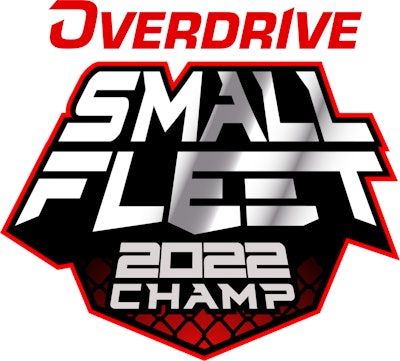 This is one of 10 profiles of carrier semifinalists for Overdrive's 2022 Small Fleet Champ competition, sponsored by the National Association of Small Trucking Companies. The program will conclude with two winning fleets (in 3-10-truck and 11-30-truck categories) at NASTC's October 20-22 annual conference in Nashville. Access other semifinalist profiles via this link.
This is one of 10 profiles of carrier semifinalists for Overdrive's 2022 Small Fleet Champ competition, sponsored by the National Association of Small Trucking Companies. The program will conclude with two winning fleets (in 3-10-truck and 11-30-truck categories) at NASTC's October 20-22 annual conference in Nashville. Access other semifinalist profiles via this link.

Revenue growth has been steady as Krystal Raue works hard to secure the best rates among brokers and other customers she works with. In service of that mission she's made a big pivot this year from what had been principally a reefer operation hauling a lot of meat outbound from Nebraska and Iowa, with produce on the return.
Last year, Triple R contracted with just a single owner-operator doing platform work, but as reefer spot-market rates began to fall early this year, Triple R parked most of the reefer trailers it owns. "They’re just sitting here right now," Raue said. Holding out on reefer rates and looking for ways to help owner-ops better handle this year's off-the-charts fuel costs, Raue pivoted to the power-only operations of large carriers' brokerages and others as a refuge for those owners, who "were losing time on the reefer side" sitting and burning excess fuel to maintain temps. "They can turn around more quickly on a power-only" load, she said.
In addition to the two hotshots pulling shorter flatbeds, a few other owners leased there pull flats -- and one step deck, too, shown below.
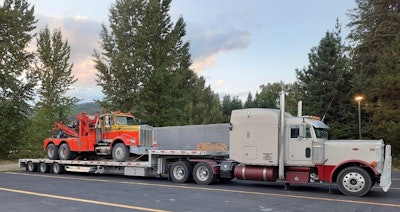 Pictured here is a Triple R-leased rig whose owner-operator came to the company after years doing platform work.
Pictured here is a Triple R-leased rig whose owner-operator came to the company after years doing platform work.
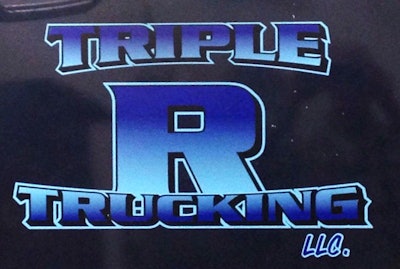
Raue said having the platform options has helped keep profitability as high as it can be in a tough time, along with the variety of power-only options. Despite recent bad news for flatbed spot rates, from her perch at Triple R, Raue noted she "hasn't really seen flatbed drop off too much," spot or contract (one of her flat pullers runs contract leads that originate locally).
She's got her eye on new opportunities, too. After starting the process in 2021, Triple R this year got registered direct with U.S. Food and Drug Administration for more of a straight path to emergency-assistance loads through FEMA. Raue and company have hauled FEMA loads through brokers in the past, including ice to hurricane-affected areas, so she's seen the revenue that can generated. There's more to it for her, though.
“The money is good, but making sure that people are getting what they need is what’s most important,” Raue said. “We’ll sit down there as long as we need to. We just try to help out as much as we can.”
The new FEMA contract hasn't yielded business yet, but she's been hard at work schooling herself on the portals used for load tendering there in preparation for this year's hurricane season. "I've been watching the training videos and learning how to navigate the government’s web programs," she said. "They say their loads really pick up in October."
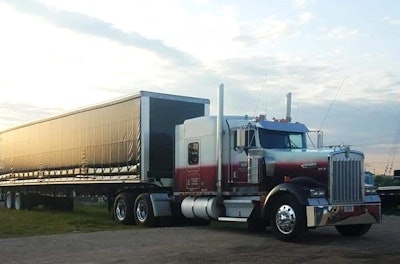 Owner-operator and close partner in the business Daymon Raue hauls personally in this pristine Kenworth W9, though he's been in the back office much of the recent period, down after rotator cuff surgery, helping Krystal with the business's transition from mostly refrigerated freight. The two have been married since 2008.
Owner-operator and close partner in the business Daymon Raue hauls personally in this pristine Kenworth W9, though he's been in the back office much of the recent period, down after rotator cuff surgery, helping Krystal with the business's transition from mostly refrigerated freight. The two have been married since 2008.
Focusing on safety
Through the years, Triple R has received numerous recognitions from its insurance carrier, Great West Casualty, for both highway and workplace safety, the latter every year since since 2015. The company's received the highway safety award four times during that period, with the silver award in 2015, 2020 and 2021, the gold award in 2018 and the platinum award in 2019.
“It’s harder for us because it’s based on mileage and accidents,” Raue said. In 2020, “we drove 580,000 miles, but we had one accident in June, and that kicked us down to silver," as also happened in 2021. "It’s about keeping those at-fault accidents away. We’re trying to keep pushing our miles up, keeping drivers rolling, and making sure they’re watching what’s going on and avoiding those accidents, being those responsible drivers and trying to prevent accidents.”
The company’s operators are required to take quarterly safety tests online, in which they have to watch a video and take a quiz each quarter, part of NASTC's safety programs for its fleet members, among which is Triple R Trucking.
Triple R pays its leased owners on a percentage of the load basis. Starting out, new owner-operators with the company who use the company’s trailers make 72% of the load, plus an additional fuel surcharge, as do those pulling power-only loads Triple R secures with a bevy of partners. That percentage goes to 75% after a 90-day review. Owners that bring their own trailer to the business take home 85% of the load. In all cases: also plus a fuel surcharge.
The company's NASTC membership yields savings from the NASTC fuel card and other benefits. Owner-operators get 100% of the fuel savings from the NASTC card passed to them.
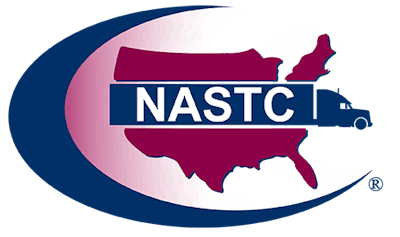 The National Association of Small Trucking Companies is sponsoring this year's Small Fleet Championship program. Finalists will receive a year's worth of membership in the association, with access to a myriad of benefits from NASTC's well-known fuel program to drug and alcohol testing services and more. All will be recognized at the association's annual conference, where the winner will be announced in October. Find more about the association via their website.
The National Association of Small Trucking Companies is sponsoring this year's Small Fleet Championship program. Finalists will receive a year's worth of membership in the association, with access to a myriad of benefits from NASTC's well-known fuel program to drug and alcohol testing services and more. All will be recognized at the association's annual conference, where the winner will be announced in October. Find more about the association via their website.
While such dramatic shifts on the basis of very few violations in that system are well-known among carriers -- and among the reasons Congress pulled the scores from public view in 2015 -- given all the private services re-creating those scores for anyone wanting to use them, Amazon "just looks at the number," Raue noted.
Clearly, she's not sitting on her hands, as it were. Her mostly-carrots-and-a-few-sticks program around roadside inspections "gives the drivers an incentive to keep their stuff together,” she said. “I don’t want any CSA points, [the drivers] don’t want any CSA points, so we all get along there.”
[Related: Customer diversification key to Lamb Fuels' recent growth]
